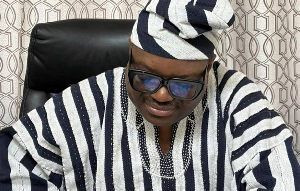Former President, Flt Lt Jerry John Rawlings says the ordinary people of Africa are expectant of a wave of leadership that listens, serves and represents the real aspirations of the people.
He said: “Africa deserves better from its own leadership and we cannot fail them.”
Speaking at a colloquium organized by the ECOWAS Parliament in Abuja to mark 50 years of African Independence on Saturday October 3, former President Rawlings said post-independence Africa had encountered challenging periods that had shaken the very foundations of “our political, social and economic sovereignty”.
“But while the political landscape on the continent may seem quite stable now, we still have not infused and brought along the civility, integrity and democratic practices that is unique to our culture into the adopted governance of state,” President Rawlings said.
He lamented, “we have simply adopted a Western form of democracy, applying it in a superficial and intimidating manner, when the infusion of our cultural practices could have given it so much substance, integrity and authority without the need for some of the coercive and intimidating practices.”
Former President Rawlings called for an appreciation of the truth and spirituality in our culture and how that could impact positively on our politics. He said the continent could not afford to stay in a time warp and allow some elected leaders to become autocratic and tend to abuse our freedoms through intimidation and corruption and later attempt to stay in power even when they have lost the mandate of the people.
Turning to members of the ECOWAS Parliament, the former President challenged them to use their various national parliaments to hold the incumbent executive in check.
“Why can we not use the legislature to prevent such ills while in office? Do we not have the power to demand investigations into the wrongs perpetrated by some of us in power? “Some of the most heinous crimes call for impeachment. We think about it, we whisper about it and let it go.
How then can we exercise the checks and balances? Wherein lies our power if we cannot check such excesses? So we wait till we are thrown out of office before we see justice sometimes being applied. Our failure to take the moral high ground and check these political aberrations by the executive give fertile ground for preventable distractions in our political development.
“…It is not uncommon for some of our parliaments to refuse to ratify protocols that have been approved at the highest level of ECOWAS. It is not untrue to say that most parliaments spend their time endorsing government policies whether they are good or bad.
“It is very easy to raise all the accusing fingers at the executive, but why would some in the executive not run wild if some in the legislature, the judiciary and even the media are compromised through petty political biases?”
Find below the full text of the former President’s speech
ADDRESS BY H. E. FLT LT JERRY JOHN RAWLINGS, FORMER PRESIDENT OF GHANA AT A COLLOQUIUM ORGANISED BY THE ECOWAS PARLIAMENT TO COMMEMORATE 50 YEARS OF AFRICAN INDEPENDENCE – ABUJA, NIGERIA, OCTOBER 2, 2010
Mr. Chairman, Right Honourable Speaker, Your Excellencies, Distinguished Guests, Ladies and gentlemen:
I wish to thank the organisers of this colloquium for creating an avenue for a much-needed analysis of the performance of our countries, 50 years after we claimed freedom from colonialism.
Many of our countries have seen significant socio-economic development, but none can boast of not having fallen victim to the treachery of our colonial past and the imperfections of some our leaders who sometimes relegate the aspirations of the people to the background.
We have over the past 50 years encountered turbulent periods, which have shaken the very foundations of our political, social and economic sovereignty. But while the political landscape on the continent may seem quite stable now, we still have not infused and brought along the civility, integrity and democratic practices that is unique to our culture, into the adopted governance of state.
We have simply adopted a Western form of democracy - applying it in a superficial and intimidating manner, when the infusion of our cultural practices could have given it so much substance, integrity and authority without the need for some of the coercive and intimidating practices.
Ladies and gentlemen, we need to start appreciating the truth and spirituality in our culture and how that would impact positively on our politics.
We cannot afford to stay in a time warp where we elect leaders, some of whom become autocratic and tend to abuse our freedoms through intimidation and corruption and attempt to perpetuate their stay in power even when they have lost the mandate of the people. We cannot continue to wish poverty on our people so we can compromise them with promises of riches during electoral periods.
Our political growth has to be strengthened through the inculcation of the virtues of homemade leadership skills.
The President is the representative of the people. He is there to reflect the judicial consciousness of the people so justice does not elude them. The judicial consciousness of our people is our greatest insurance for justice.
Let me at this point commend Nigeria’s late President Y’Adua for the efforts he made to prevent an attempt to steal power in Ghana during the 2008 Presidential and Parliamentary elections. That intervention saved Ghana from another eruption. What happened in South Africa is also pretty much unheard of - where the party machinery boldly and politely tells a sitting president that enough is enough. This is something that never happens and it is both a credit to the country, party and to the executive.
As political leaders, we get into office and use the executive power to muzzle the opposition and oftentimes undermine and cripple the very party that put us into office.
How then is the executive held in check? Is it any wonder that we start attempting to find a cure only after they have left office? Why can we not use the legislature to prevent such ills while in office? Do we not have the power to demand investigations into the wrongs perpetrated while some of us in power?
Some of the most heinous crimes call for impeachment. We think about it, we whisper about it and let it go. How then can we exercise the checks and balances? Wherein lies our power if we cannot check such excesses? So we wait till we are thrown out of office before we see justice sometimes being applied. Our failure to take the moral high ground and check these political aberrations by the executive give fertile ground for preventable distractions in our political development.
Following the collapse of the bipolar world and a certain understanding that coups are a thing of the past, state institutions such as the judiciary and the legislature have a responsibility to operate above reproach and serve as true checks and balance on the executive. Unfortunately we seem to endorse the Executive sometimes to the detriment of the electorate who voted us into power.
This colloquium may not have been organised to critique the activities of our legislature, but since it is under the umbrella of the ECOWAS Parliament, which has representation from all the parliaments in the sub-region I have to re-emphasise the need for representatives to exercise the true role of such bodies.
It is not uncommon for some of our parliaments to refuse to ratify protocols that have been approved at the highest level of ECOWAS. It is not untrue to say that most parliaments spend their time endorsing government policies whether they are good or bad.
It is very easy to raise all the accusing fingers at the executive, but why would some in the executive not run wild if some in the legislature, the judiciary and even the media are compromised through petty political biases?
As we all deliberate here today, let us refrain from scratching the surface and paying lip service to any conclusions that we arrive at. I throw a challenge to all legislators gathered here to endeavour to impress upon their various national assemblies to ratify the numerous protocols aimed at enhancing the integration of the sub-region. It is only when a concerted effort is applied to these various agreements that the true objectives of ECOWAS can be achieved.
Our people are expectant of a wave of leadership that represents the real aspirations of the people. A leadership that listens and serves the people rather than take obtuse decisions on behalf of the people. Africa deserves better from its own leadership and we cannot fail them.
I take this opportunity to congratulate the President and the government and people of Nigeria on the occasion of the country’s 50th birthday.
Thank you!
General News of Monday, 4 October 2010
Source: http://jjrawlings.wordpress.com













